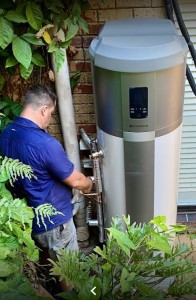The frequency of servicing your hot water system can vary depending on several factors, however, as a general guideline a minor service to your water heater should be conducted annually with a major service conducted every 5 years.
General Rule of Thumb
- DIY Maintenance: It’s recommended to inspect your hot water system every 6 months – 12 months. This involves checking your system to identify any leaks at the tank, valves and plumbing connections, and periodically performing task such as lifting the relief valve on your system to release excess pressure and hot water. This regular maintenance can help identify and address any potential issues before they become major. If you have a solar hot water split system, checking of the circulation pump for its operation is crucial for solar performance.
- Major Service: In addition to DI Y maintenance, a major service to your water heater should be conducted by a licensed professional every 5 years as per the guideline below.
- Manufacturer’s Recommendations: The manufacturer of your system may have specific guidelines for servicing intervals. Checking the owner’s manual or contacting the manufacturer
 will confirm this. Servicing of your system will be necessary in the event of a manufacturer’s warranty claim.
will confirm this. Servicing of your system will be necessary in the event of a manufacturer’s warranty claim. - Type of Hot Water System: The type of hot water system you have can also influence the servicing schedule. For example, a solar hot water system might require periodic checks of solar panels and fluid levels.
- Signs of Trouble: Apart from regular servicing intervals, keep an eye out for signs that your hot water system might need attention sooner. These signs could include strange noises, water leaks, fluctuating water temperatures, or reduced efficiency.
Ultimately, regular servicing helps maintain the efficiency and lifespan of your hot water system while minimising the risk of unexpected breakdowns. If you’re unsure about the appropriate servicing schedule for your specific system, it’s always a good idea to consult with a qualified plumber or technician.
What’s Involved in Servicing your Water Heater?
When servicing a hot water system, several tasks should be performed by a licensed professional to ensure its optimal performance, safety, and longevity. Here’s a general checklist of what typically needs to be done during a hot water system servicing:
- Inspect for Leaks: Check all connections, valves, and pipes for any signs of leaks. Address any leaks promptly to prevent water damage and inefficiency.
- Check Pressure Relief Valve: Test the pressure relief valve to ensure it’s functioning correctly. This valve is crucial for relieving excess pressure buildup in the tank, preventing potential explosions.
- Inspect Anode Rod: Check the condition of the anode rod (only applicable to non-stainless steel tanks). This sacrificial rod helps prevent corrosion within the tank by attracting corrosive elements. If it’s deteriorated significantly, it may need to be replaced.
- Check Thermostat Settings: Verify that the thermostat settings are accurate and that the temperature is set to a safe and efficient level.
- Inspect Venting: For gas-powered water heaters, inspect the venting system to ensure proper airflow and venting of combustion gases. Blocked or damaged vents can pose a safety hazard.
- Test Heating Elements: If you have an electric water heater or a solar hot water system (for the booster function), test the heating elements to ensure they are functioning correctly. Replace any faulty elements as needed.
- Inspect Electrical Components: Check electrical connections, wiring, and controls for any signs of wear, damage, or malfunction.
- Check for Corrosion: Inspect the tank and components for any signs of corrosion. Address any areas of concern to prevent further damage.
- Test Water Quality: Check the quality of the hot water, including temperature consistency and any unusual odours or discoloration. Poor water quality can indicate issues with the system.
- Inspect Insulation: Check the insulation around the tank and pipes to ensure it’s in good condition. Proper insulation helps improve energy efficiency and prevent heat loss.
- Verify Expansion Tank: If your system includes an expansion tank, check its pressure and condition. The expansion tank helps accommodate fluctuations in water pressure and temperature.
- Check for Gas Leaks: If you have a gas-powered water heater, inspect for any gas leaks around the connections and fittings. Address any leaks immediately for safety reasons.
- Clean Exterior and Surroundings: Clean the exterior of the water heater and the surrounding area to remove dust, debris, and any potential fire hazards.
- Document and Report: Keep detailed records of the servicing, including any repairs or maintenance performed. Report any significant issues or recommendations to the homeowner or property owner.
It’s essential to follow manufacturer guidelines and safety procedures when servicing a hot water system. If you’re unsure about any aspect of servicing, it’s best to consult with a qualified plumber or technician. Contacting a professional technician experienced in water heater repairs is recommended for proper diagnosis and repair. Find out more about how we can help you or get in touch with your questions. Ask for a free quote today Call 0416 075 682 or Contact Us HERE.
